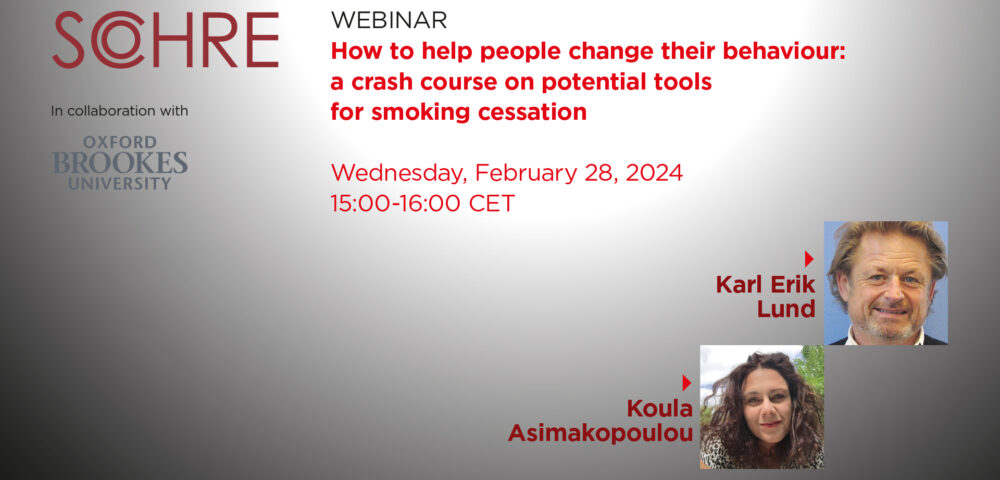
SCOHRE Webinar | “How to help people change their behaviour”
Event Date: 28 February 2024 || 15:00-16:00 CET
Location: Webinar
‘Opportunity and Motivation are better ways to help people to give up any unhealthy behaviour than plain information-giving and fear campaigns’ were amongst the messages in the 1st webinar of 2024, organised by SCOHRE, the International Association on Smoking Control & Harm Reduction.
The webinar entitled “How to help people change their behaviour: a crash course on potential tools for smoking cessation”, with guest speaker Professor Asimakopoulou, was organised in collaboration with Oxford Brookes University, and its topic has been ‘behaviour change in smoking cessation’. Supporting people to give up any unhealthy behaviour is routine for many Health Care Professionals (HCPs). The webinar outlined psychological evidence that points to common barriers that get in the way when people attempt to undertake health-related behaviour change and Professor Asimakopoulou brought into the talk evidence from the behavioural science domain.
The webinar, coordinated by Dr Karl Erik Lund, Vice-president of SCOHRE, started with an identification of common barriers to behaviour change. It was suggested that behaviour change can be difficult for people and an acknowledgment that HCPs are not just dealing with ‘difficult’ patients was important.
Professor Asimakopoulou explained that often behaviour change fails at the very start in that patients do not recall the messages HCPs are attempting to convey. She then moved on to talk about cognitive biases such as the concept of unrealistic optimism that make people think that they are less at risk than other people who are similar to them. The talk then discussed the idea of habit and presented evidence to show how habits form and why they are hard to break. The webinar then considered two often used techniques HCPs use in practice to bring about change. Information-giving and fear campaigns were evaluated and evidence presented to suggest that in themselves these techniques may not be that helpful. Indeed, tackling Capability, Opportunity and Motivation are better ways, grounded in science, to bring change. Professor Asimakopoulou then shared the Behaviour Change Technique taxonomy that contains just under 100 different behaviour change techniques to tackle Capability, Opportunity and Motivation with patients. The final part of the talk gave a summary of three popular and evidenced methods to change behaviour in smoking – these were Cognitive Behavioural Therapy, Acceptance and Commitment Therapy and Motivational Interviewing. The webinar discussed the broad principles behind each one and noted ideas about their further use with patients.
Speakers
Koula Asimakopoulou, BSc (Hons), PhD, CPsychol; Professor of Health Psychology & Associate Dean Research and Knowledge Exchange, Oxford Brookes University, UK; Visiting Professor King’s College London, UK; HCPC-Registered Health Psychologist
Karl Erik Lund, Ph.D., Senior Researcher, Norwegian Institute of Public Health, Norway & SCOHRE Vice-President
If you missed the webinar you can still watch it here!

